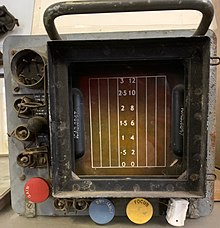Monica (radar)
 Monica Mk III Indicator Unit | |
| Country of origin | the United Kingdom |
|---|---|
| Introduced | June 1942[1] |
Monica was a range-only tail warning radar for bombers, introduced by the RAF in June 1942.[2] Officially known as ARI 5664,[3] it operated at frequencies of around 300 MHz (on the boundary between VHF and UHF). The system was also used by the US Army Air Forces, under the name AN/APS-13, and the nickname Archie.
History
Monica was developed at the Bomber Support Development Unit (BSDU) in Worcestershire.[citation needed] After the Luftwaffe became aware of Monica from a crashed bomber, German scientists developed a passive radar receiver, named Flensburg (FuG 227). From early 1944, FuG 227 was used by nightfighter crews to home in on Allied bombers using Monica.[4] However, on the morning of 13 July 1944, a 7.Staffel/NJG 2-flown Junkers Ju 88 G-1 nightfighter equipped with Flensburg mistakenly landed at RAF Woodbridge. After examining the Flensburg equipment, the RAF ordered Monica withdrawn from all Bomber Command aircraft.[5] An AN/APS-13 was used as a radar altimeter during the Atomic bombings of Hiroshima and Nagasaki by the 509th Composite Group, USAAF.
See also
- List of radars
- List of World War II electronic warfare equipment
- List of military electronics of the United States
References
- ^ Robert Forczyk (20 June 2013). Bf 110 vs Lancaster: 1942–45. Bloomsbury Publishing. pp. 15–. ISBN 978-1-78096-318-1.
- ^ "Bf 110 vs. Lancaster", Robert Forczyk, Osprey Publishing, 2013, p. 11
- ^ René J. Francillon (9 December 2017). HIGH-SPIRITED MUSTANG Volume I: The saga of the North American Aviation P-51 Mustang - Part 1 : Development and Production. Eirl Aerosphere Research. pp. 168–. GGKEY:25JLGUZ502L.
- ^ Price, p. 100.
- ^ Price, p. 154.
External links
- Oral History of Defence Electronics
- Folded Dipole UHF Yagi antenna patent used on Little Boy[dead link]
